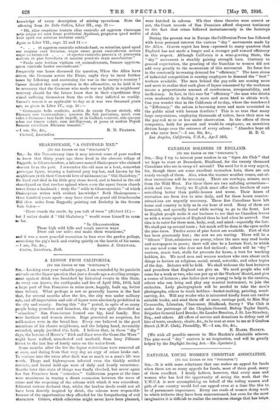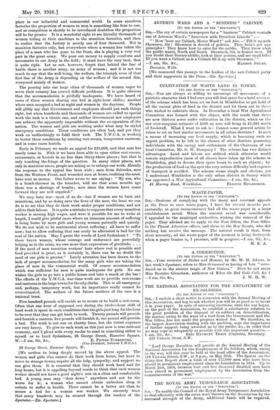NATIONAL YOUNG WOMEN'S CHRISTIAN ASSOCIATION.
ITO THE EDITOR OP THE "SPECTATOR."] Snm,—It is with some reluctance that one makes an appeal for funds when there are so many appeals for funds, most of them good, many of them excellent. I firmly believe, however, that every man and, woman who has had the opportunity of seeing the work that the. Y.W.C.A. is now accomplishing on behalf of the toiling women and girls of our country would feel our appeal even at a time like this to, be of paramount importance. Every one roads of women doing work, to which hitherto they have been unaccustomed, but even for the most imaginative it is difficult to realize the enormous change that has talm.
place in our industrial and commercial world. In some munition factories the proportion of women to men is something like four to one, and as compulsion is shortly to be introduced doubtless the proportion will be far greater. It is a wonderful sight to see literally thousands of women toiling at their machines in the munition factories, and then to realize that the factory is merely one of four thousand. Not in munition factories only, but everywhere where a woman has taken the place of a man who has gone to the front, she is playing a very real part in the great army. We pour out money to supply comforts and necessaries to our Army in the field ; it must have the very best, that is quite right. Let us not, however, forget that behind the line of battle there is another army, an army of women ; and it is not too much to say that the well-being, the welfare, the triumph even of that first line of the Army is depending on the welfare of the second line, composed mainly of women.
The pouring into our large cities of thousands of women eager to serve their country has caused difficult problems. It is quite obvious that the accommodation is pitifully inadequate. Wo have heard of cases of three women sharing one bed in eight-hour shifts ; another where men occupied a bed at night and women in the daytime. People will glibly say that Government and employers should put such things right, but when hundreds and thousands of women are called to special work the task is a titanic one, and neither Government nor employers can achieve the apparently impossible without the co-operation of the nation. The women and girls are working under what may be styled emergency conditions. These conditions are often bad, and yet they work on unflinchingly to fulfil their task. The Y.W.C.A. is working to better these conditions by erecting rest-rooms, temperance canteens, and in some cases hostels.
Early in February we made an appeal for £25,000, and that sum has nearly come in. With it we have been able to open either rest-rooms, restaurants, or hostels in no less than thirty-three places ; but that is only touching the fringe of the question. In many other places, not only in munition areas, people are asking us to enlarge our work. Already the response to the appeal has been wide ; men from Salonika, men from the Western Front, and wounded men at home, realizing the need, have sent us money. One father wrote to me saying " My son, who is a bomb-thrower in the trenches, told me that some months ago there was a shortage of bombs ; now since the women have come forward they are well supplied."
We may hate war—most of us do—but if women are to turn out munitions, and by so doing save the lives of the men, the least we can do is to see that they do their work under proper conditions, and not add to their labour. It is quite a mistake to suppose that every munition worker is earning high wages, and were it possible for me to write at length, I could give pitiful cases where an immense amount of suffering is being borne by more girls and young women patiently and quietly. We do not wish to be sentimental about suffering ; all have to suffer now; but to allow suffering that can easily be alleviated is bad for the soul of the nation. May I quote the words of Lord Sydenham ? "To these brave women, whose courage and endurance are powerfully helping us in the crisis, we owe more than expressions of gratitude. . . . If the need of men munition workers' huts where rest is possible and food provided is great, as it certainly is, there can be no doubt the need of our girls is greater." Lately attention has been drawn to the lack of proper accommodation for the many girls who are taking the place of men in the commercial world. Of course accommodation which was sufficient for men is quite inadequate for girls. No one wishes the girls to go into a public-house and take a snack at the bar ! The efforts of the Y.W.C.A. war-time work are to provide rest-rooms and canteens in the large towns for the city clerks. This is all emergency and, perhaps, temporary work, but its importance really cannot be overestimated. The welfare of the future mothers of the race is a national trust.
Five hundred pounds will enable us to secure or to build a rest-room. Often that one hour of supposed rest during the twelve-hour shift of hard work is spent in such conditions that the girls just long for the hour to be over that they can get back to work. Twenty pounds will provide and furnish a canteen, five pounds will furnish it, one pound will provide a bed. The work is not run on charity lines, but the initial expenses are very heavy. To give to such work as this just now is true national economy, and I plead with every reader to send in something either to myself or to Lord Sydenham, 26 George Street, Hanover Square, (Vice-President, National Y.W.C.A.).
26 George Street, Hanover Square, W.
[We confess to being deeply moved by the above appeal The women and girls who cannot do their work from home, but have to move to strange towns, require all the help, sympathy, and support we can give them. It is essential that they should work hard and for long hours, but it is appalling beyond words to think that each woman worker should not have a good night's rest on a clean and comfortable bed. A young man may "doss down" anywhere and not be the worse for it; a woman who cannot obtain unbroken sleep is certain to suffer in health. There cannot be a better act than to secure a bed for a woman war worker. We sincerely trust that many hundreds may be secured through the readers of the Spectakff.—En. Spedator.1































 Previous page
Previous page